 There are times, in approaching a film for Supporting Actress Sundays, where I'm fairly certain I know exactly what I'll say about the featured performance. But one thing I've learned as a result of the careful attention obliged by the StinkyLulu method (in which I screen the performance at least three times: once in the context of the whole film, a second time while I clock the performance's screentime, and a third while I gather screenshots) is that, the more certain I am about what I think I'll think about a performance, the more likely my prejudgments will be completely off-base. Sometimes I'll remember a performance as all nuance and sophistication, only to be stunned by its simplistic shallowness. Other times I'll recall a performance as negligible only to be shocked at the depth, sophistication and craft actually at work, as in the case of...
There are times, in approaching a film for Supporting Actress Sundays, where I'm fairly certain I know exactly what I'll say about the featured performance. But one thing I've learned as a result of the careful attention obliged by the StinkyLulu method (in which I screen the performance at least three times: once in the context of the whole film, a second time while I clock the performance's screentime, and a third while I gather screenshots) is that, the more certain I am about what I think I'll think about a performance, the more likely my prejudgments will be completely off-base. Sometimes I'll remember a performance as all nuance and sophistication, only to be stunned by its simplistic shallowness. Other times I'll recall a performance as negligible only to be shocked at the depth, sophistication and craft actually at work, as in the case of...approximately 34 minutes and 25 seconds
25 scenes
roughly 31% of film's total running time
25 scenes
roughly 31% of film's total running time
Natalie Wood plays Judy, a girl who wants to be good but is better at being bad.
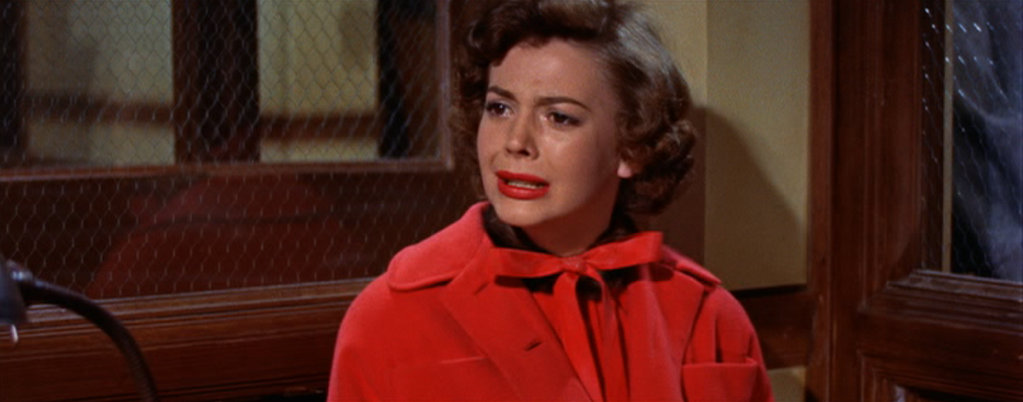 The character of Judy is deceptively simple. On first glance, she seems merely a rebellious innocent prone to big talk, daddy issues, and life-changing crushes on bad boys.
The character of Judy is deceptively simple. On first glance, she seems merely a rebellious innocent prone to big talk, daddy issues, and life-changing crushes on bad boys.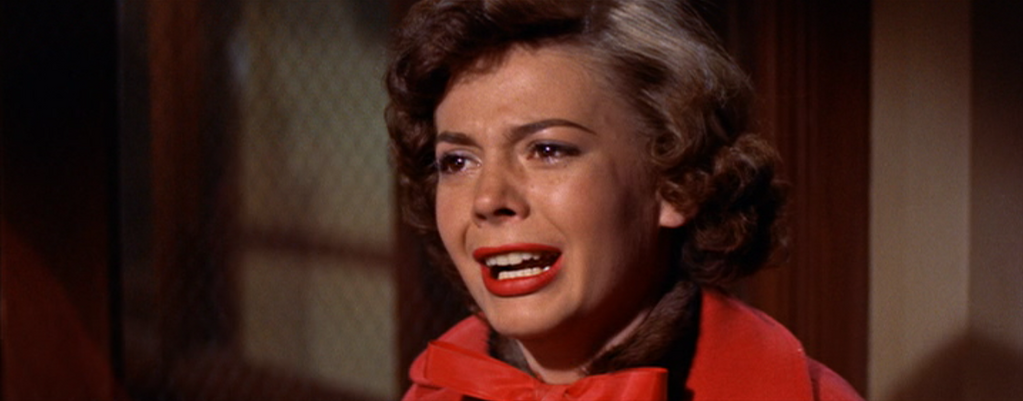 Even as Judy's proto-delinquent path crosses Jim's -- the new good/bad boy in town (James Dean in a fascinating, iconic performance) -- there doesn't seem much in the way of surprises with either the character of Judy or Natalie Wood's performance in the role. Yet, director Nicholas Ray and actress Natalie Wood are crafty devils, emphasis on the crafty. Perhaps the most interesting thing about Ray and Wood's work in the film is how baldly the first scene proclaims Judy's subtext, backstory, her entire character really: she's a petulant adolescent who resents her father for not paying attention to her. And in those first screechy, weepy scenes, Natalie Wood nails the truth of that anxious, self-involved despair. The tricky part? Ray and Wood are not showing Judy's hand, but laying the foundation for what comes next.
Even as Judy's proto-delinquent path crosses Jim's -- the new good/bad boy in town (James Dean in a fascinating, iconic performance) -- there doesn't seem much in the way of surprises with either the character of Judy or Natalie Wood's performance in the role. Yet, director Nicholas Ray and actress Natalie Wood are crafty devils, emphasis on the crafty. Perhaps the most interesting thing about Ray and Wood's work in the film is how baldly the first scene proclaims Judy's subtext, backstory, her entire character really: she's a petulant adolescent who resents her father for not paying attention to her. And in those first screechy, weepy scenes, Natalie Wood nails the truth of that anxious, self-involved despair. The tricky part? Ray and Wood are not showing Judy's hand, but laying the foundation for what comes next.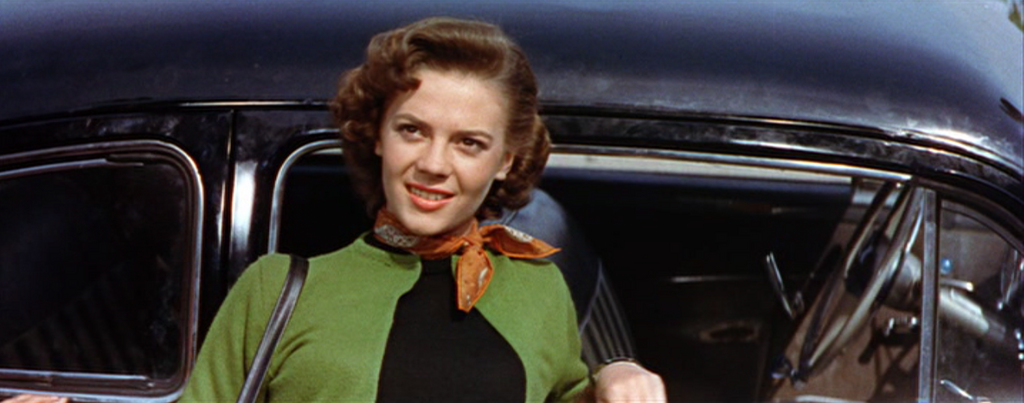 Comparably, Wood efficiently accomplishes the ruse of Judy's badgirl mask, when she first meets Dean's Jim and idly rides along as "the kids" taunt and torment him. Wood clearly and simply shows Judy sliding in and out of the tough tart part, punctuating the scenes with tiny private moments (checking to see that Buzz is ok after the previous evening's chicken contest, startling herself in her compact mirror with a flash of recollection of the previous evening's jailhouse travails).
Comparably, Wood efficiently accomplishes the ruse of Judy's badgirl mask, when she first meets Dean's Jim and idly rides along as "the kids" taunt and torment him. Wood clearly and simply shows Judy sliding in and out of the tough tart part, punctuating the scenes with tiny private moments (checking to see that Buzz is ok after the previous evening's chicken contest, startling herself in her compact mirror with a flash of recollection of the previous evening's jailhouse travails).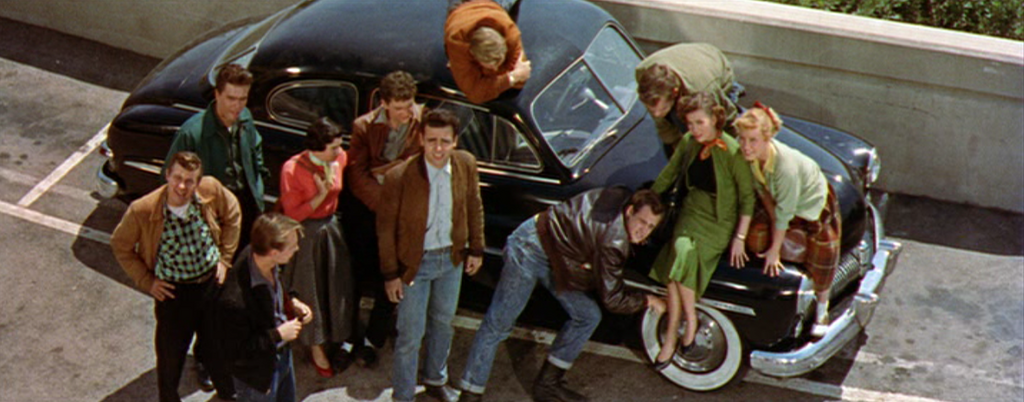 Between these two sets of scenes, Ray and Wood vividly depict two faces of Judy. Whether either Judy is an act becomes less important than the fact that she's so adept at being both, of being whoever she needs or wants to be at any given moment. And to her credit, Wood seems to get this. The actress seems to appreciate Judy's "pretend" as a mode of self-protection and self-preservation. (It's frankly impossible for me to consider the character of Judy and not interpret her daddy fixation as somehow symptomatic of intrafamilial child-sexual abuse: that Judy's gotten "too old" for Daddy's special attention; that the mother's at once attuned and oblivious to "something" going on between her daughter and her husband; that Judy shares a curiously protective bond with both her younger brother and Plato... Judy's not only a textbook badgirl, but also a textbook survivor.)
Between these two sets of scenes, Ray and Wood vividly depict two faces of Judy. Whether either Judy is an act becomes less important than the fact that she's so adept at being both, of being whoever she needs or wants to be at any given moment. And to her credit, Wood seems to get this. The actress seems to appreciate Judy's "pretend" as a mode of self-protection and self-preservation. (It's frankly impossible for me to consider the character of Judy and not interpret her daddy fixation as somehow symptomatic of intrafamilial child-sexual abuse: that Judy's gotten "too old" for Daddy's special attention; that the mother's at once attuned and oblivious to "something" going on between her daughter and her husband; that Judy shares a curiously protective bond with both her younger brother and Plato... Judy's not only a textbook badgirl, but also a textbook survivor.)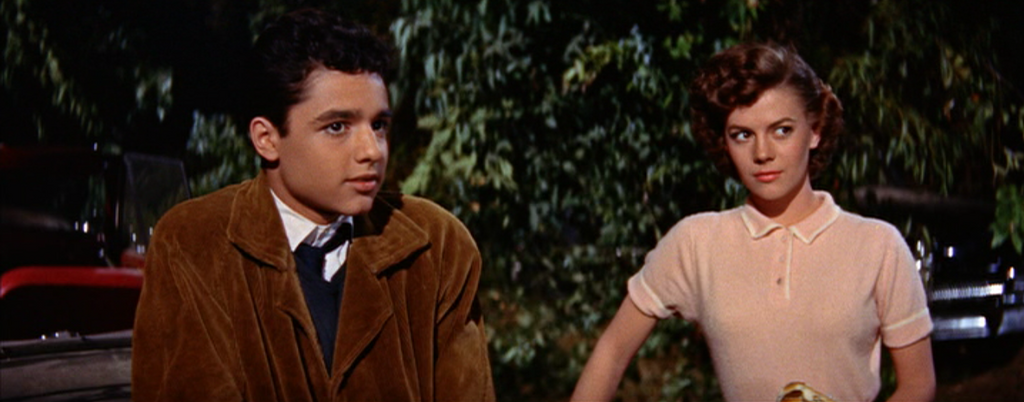 In Judy, Ray and Wood construct a really smart and effective exploration of teen identity experimentation. It's not that Judy doesn't know who she is. Rather, she's not sure who she needs to be. And, in the thirty or so hours of her life that the film depicts, Wood's Judy has some experiences that transform her from desperate child to fearful young woman.
In Judy, Ray and Wood construct a really smart and effective exploration of teen identity experimentation. It's not that Judy doesn't know who she is. Rather, she's not sure who she needs to be. And, in the thirty or so hours of her life that the film depicts, Wood's Judy has some experiences that transform her from desperate child to fearful young woman.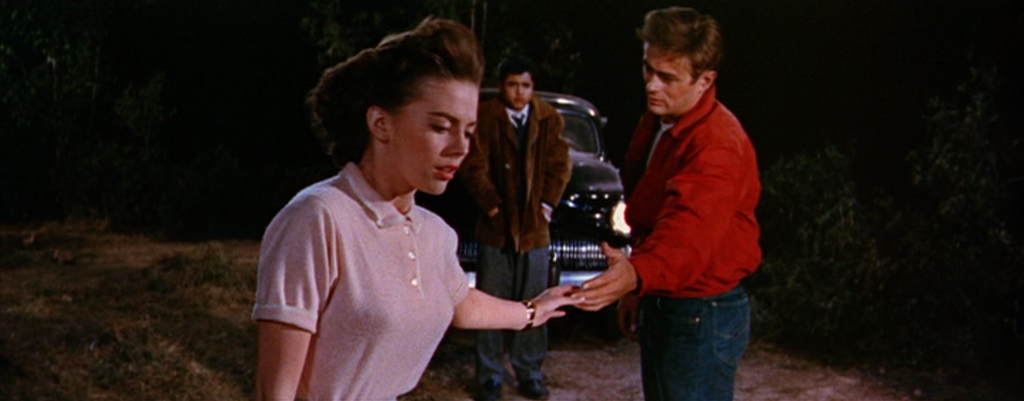 Indeed, when Buzz's car goes off the cliff, and when she's abandoned by all her friends, Judy's at a loss for who to be -- until she finds a new idea of herself reflected in the sweet horndog gaze of Dean's Jim.
Indeed, when Buzz's car goes off the cliff, and when she's abandoned by all her friends, Judy's at a loss for who to be -- until she finds a new idea of herself reflected in the sweet horndog gaze of Dean's Jim.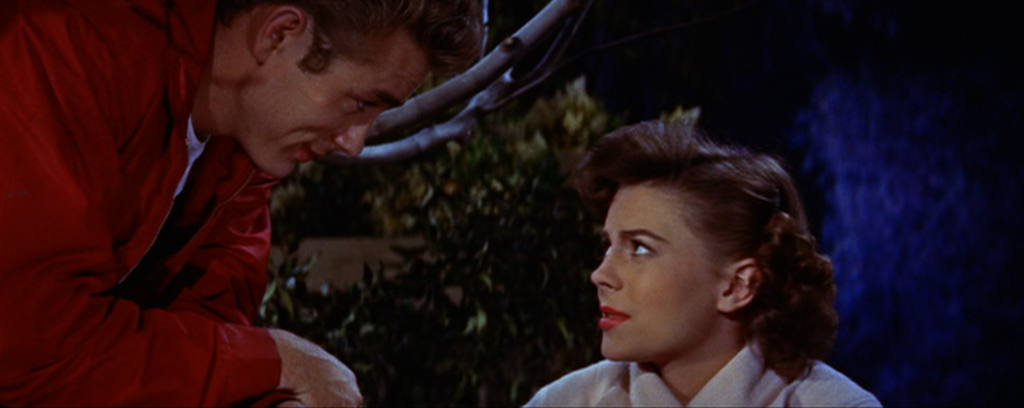 I was prepared to dismiss Wood's work in this role because I only remembered her mommy-presence in the post-chicken scenes, when the three outcasts (the rebel, the badgirl, the freak) played house in the abandoned mansion.
I was prepared to dismiss Wood's work in this role because I only remembered her mommy-presence in the post-chicken scenes, when the three outcasts (the rebel, the badgirl, the freak) played house in the abandoned mansion.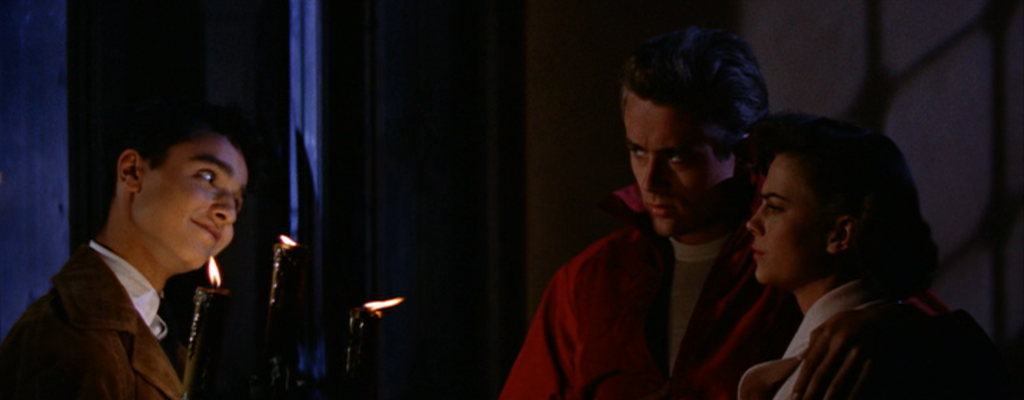 This time through though, after paying close attention to the scenes that precede the legendary sequences in the mansion, I began to appreciate how -- for Judy at least -- "playing" a role is not something she does to escape her life, but something she does to survive it. There's a lucidity, a strategy, in Wood's performance as Judy that I had missed before. Wood's Judy always knows what she's doing even if she doesn't know why she's doing it (as when she agrees to go "explore" with Jim in front of the fireplace).
This time through though, after paying close attention to the scenes that precede the legendary sequences in the mansion, I began to appreciate how -- for Judy at least -- "playing" a role is not something she does to escape her life, but something she does to survive it. There's a lucidity, a strategy, in Wood's performance as Judy that I had missed before. Wood's Judy always knows what she's doing even if she doesn't know why she's doing it (as when she agrees to go "explore" with Jim in front of the fireplace).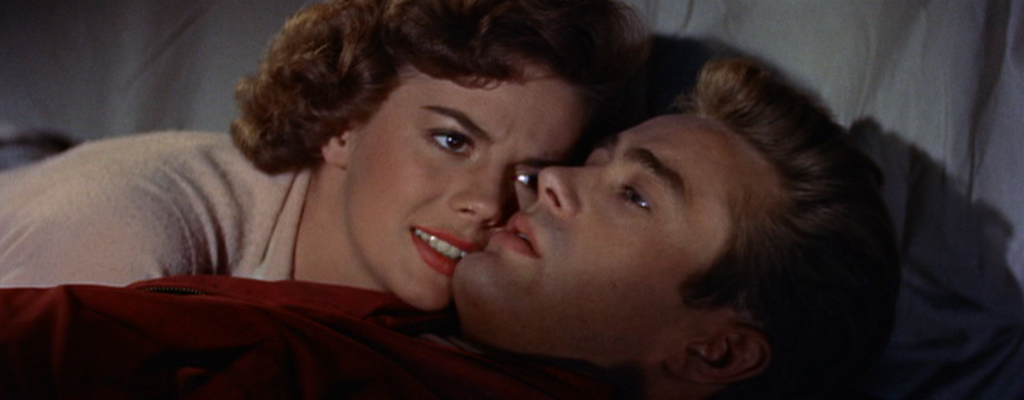 Nicholas Ray built an intricate architectural masterpiece with Rebel without a Cause. Every piece fits and Natalie Wood's does so perfectly. When Wood's Judy slides Plato's lost loafer onto his foot, it's a gesture of courtesy, respect, tenderness and utter confusion. (That stretcher scene between Jim, Judy and the housekeeper over Plato's dead body just slays me every f'n time -- yes, StinkyLulu is a 13 year old girl, and will always be.) For the first time, Judy doesn't want to play a part but all she knows to do is replace Plato's shoe.
Nicholas Ray built an intricate architectural masterpiece with Rebel without a Cause. Every piece fits and Natalie Wood's does so perfectly. When Wood's Judy slides Plato's lost loafer onto his foot, it's a gesture of courtesy, respect, tenderness and utter confusion. (That stretcher scene between Jim, Judy and the housekeeper over Plato's dead body just slays me every f'n time -- yes, StinkyLulu is a 13 year old girl, and will always be.) For the first time, Judy doesn't want to play a part but all she knows to do is replace Plato's shoe.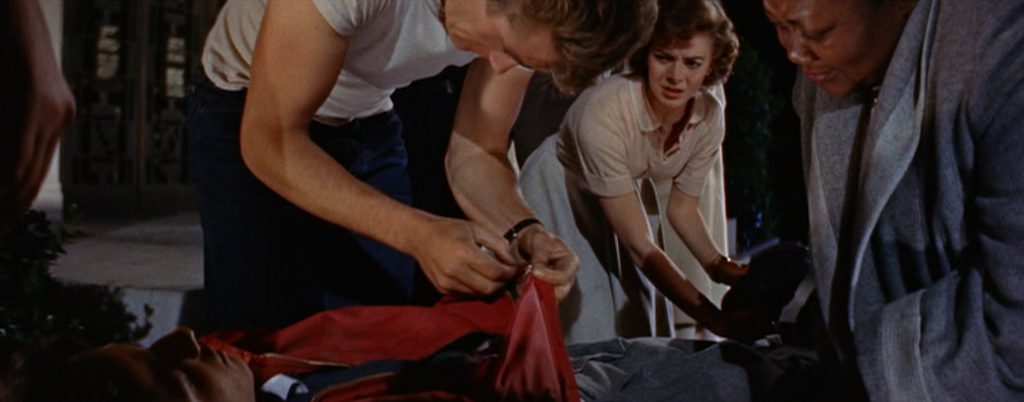 I doubt that Judy and Jim's new relationship survived the week, or that they named their first born son Plato, but golly I'm glad Jim introduced her to his parents at the end of that extraordinary night -- if only so's I could grab a screencap of this perfect shot.
I doubt that Judy and Jim's new relationship survived the week, or that they named their first born son Plato, but golly I'm glad Jim introduced her to his parents at the end of that extraordinary night -- if only so's I could grab a screencap of this perfect shot.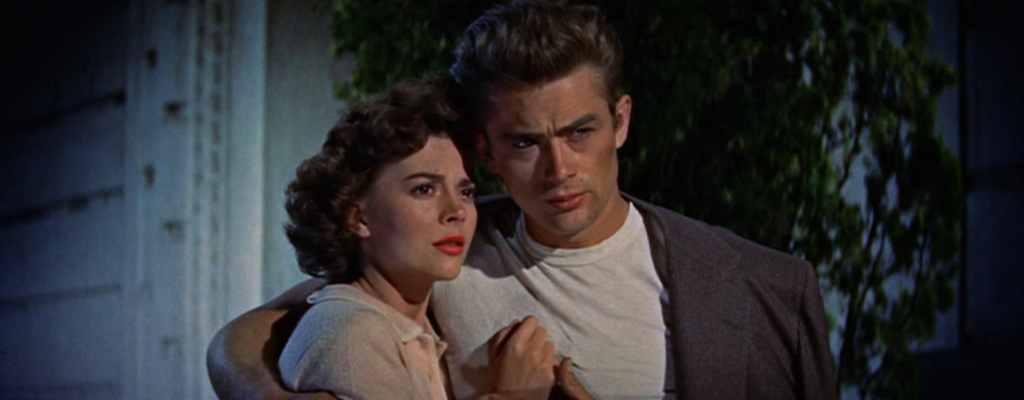 I'm still somewhat stunned that I emerged so impressed by Natalie Wood's work in the role of Judy. Smart, effective, understated, actorly in all the best ways with a simple, sublime honesty throughout. I still don't know if I love the performance, but I'm newly impressed by the work.
I'm still somewhat stunned that I emerged so impressed by Natalie Wood's work in the role of Judy. Smart, effective, understated, actorly in all the best ways with a simple, sublime honesty throughout. I still don't know if I love the performance, but I'm newly impressed by the work.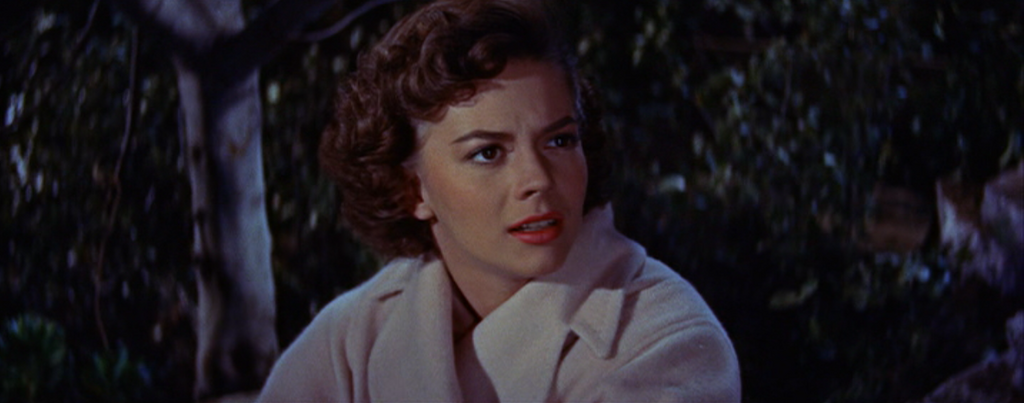 Well-played, Miss Natasha, well-played. You got me, you really got me.
Well-played, Miss Natasha, well-played. You got me, you really got me.


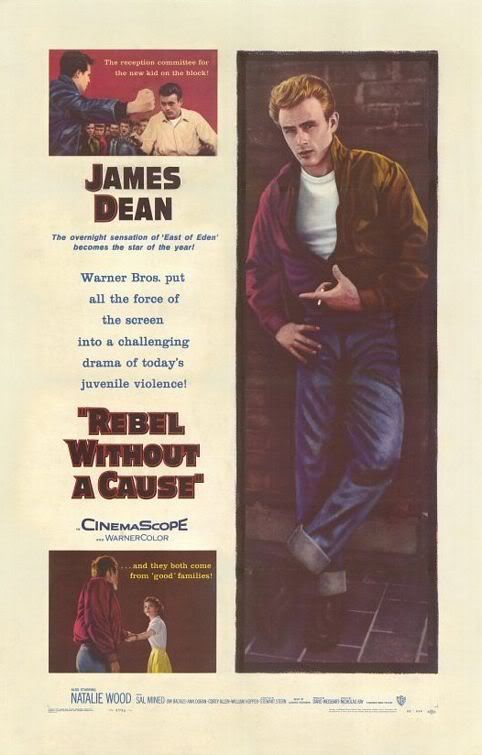
3 comments:
I rewatched this last night just to make sure I wasn't overrating. If anything, it's better than I remembered. There's vibrancy and complexity in every moment she's on screen. She gives Dean a run for his money.
Wood had better come in first...
I was really impressed, too, though to be honest, I wrote this in my notes: "All this happened, and all I got was this lousy shoe!"
I love her in this role when she's not speaking, and it's the brilliance of this, if somewhat telegraphed, that you can't trust a thing she says. She seems to know that as well, and it's perfect adolescent confusion. I love that we're unsure about her and Jim's relationship at the end--it's one of the many brilliant things about this movie. I do think this movie earns its reputation as a masterpiece--I was riveted again.
And, I have to say, I love Jim Bacchus. Love.
watching this movie again is always a treat so thanks for providing a good reason to. I am a huge Wood supporter so it's nice when other people wake up to her abilities ;)
Post a Comment